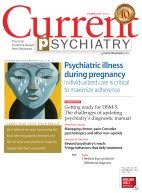Wednesday, December 2, 2009
Mindfulness interventions for depression and anxiety
Mark A. Lau, PhD, RPsych, Clinical associate professor, Department of psychiatry, University of British Columbia, Vancouver, BC, Canada
Andrea D. Grabovac, MD, FRCPC, Clinical assistant professor, Department of psychiatry, University of British Columbia, Vancouver, BC, Canada
Mindfulness-based cognitive therapy (MBCT) was originally developed to help prevent depressive relapse. MBCT also can reduce depression and anxiety symptoms. More recently, MBCT was shown to help individuals discontinue antidepressants after recovering from depression. Regular mindfulness meditation has been shown to result in structural brain changes that may help explain how the practice effectively addresses psychiatric symptoms. With appropriate training, psychiatrists can help patients reap the benefits of this cognitive treatment.
Read full text (free access)
Comment on this article
Email the editor
Labels:
anxiety,
cognitive-behavioral therapy,
depression,
mindfulness
Subscribe to:
Post Comments (Atom)


I greatly enjoyed the article on mindfulness-thank you for the comprehensive review. Do you know if there are any relative contraindications for mindfulness? For example, trauma, dissociative disorders, or psychosis?
ReplyDeleteAlso, do you know the earliest age one can benefit from mindfulness techniques? I am a child psychiatry fellow and I'm looking for new techniques to add to therapy.
Thank you so much for any input on these two questions!
Dr. Lau responds:
ReplyDeleteThere are some contraindications to using mindfulness based interventions for individuals with a trauma history or a dissociative disorder that need to be considered on a case by case basis. For example, some individuals with a trauma history can sometimes find the physical sensations experienced with the body scan anxiety-provoking, such as when memories of trauma are triggered, and experienced as overwhelming. Dr. Siegel's recent summary of the mindfulness literature in his book Mindsight has several excellent case example of using mindfulness based practices to help clients process and integrate past traumatic experiences. With regards to psychotic illnesses. there is a growing body of research examining mindfulness based interventions for psychotic disorders, including mindfulness based inpatient groups.
Mindfulness based interventions for children are rapidly expanding. See Hooker and Fodor "Teaching Mindfulness to Children" in Gestalt Review, 12(1):75-91, 2008 for a recent review. There are also several treatment manuals that have been published recently. Two examples of these are: 1. Mindfulness-Based Cognitive Therapy for Anxious Children: A Manual for Treating Childhood Anxiety by Semple and Lee and 2. Acceptance and Mindfulness Treatments for Children and Adolescents: A Practitioner's Guide by Greco and Hayes. An excellent resource for parents is Linda Lantieri's step by step guide "Building Emotional Intelligence", which provides specific guided exercises for ages 5 to 7, 8 to 11 and 12 and up, and walks parents through every step of the process of introducing these skills into the home. The website www.mindfulnesstogether.net offers resources for both clinicians as well as parents. I would also suggest participating in a 5-day training program to help consolidate skills and understanding of mindfulness-related material, as this can be an essential step in integrating and embodying mindfulness in the therapeutic endeavour. An example of a professional training program can be found at http://mindfulness.ucsd.edu .
Best regards,
Mark Lau, Ph.D., R.Psych.
Research Scientist and Director, BC Cognitive Behaviour Therapy Network
BC Mental Health & Addiction Services
PHSA Research & Networks
Clinical Associate Professor of Psychiatry, University of British Columbia
Vancouver, BC